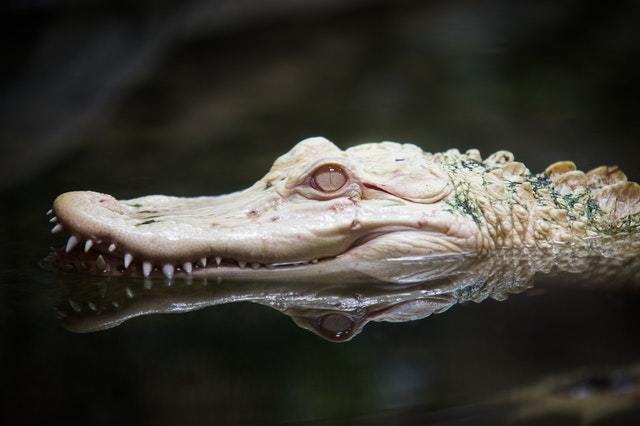Do Alligators Have Ears? (Everything You Need To Know)
If you’ve seen a picture of an alligator or the beast itself, it’s usually not obvious where the ears are. Because their ears are not visible like ours, it is not clear whether they have a hearing organ or not. So, do alligators have ears?
Alligators indeed have ears, though not external ears like humans. Their ears are located behind their eyes and give them strong hearing abilities. They can hear noise and vibrations in the water and even pick up piercing sounds that are not audible to humans.
The slits or opening behind the eyes, on top of the head of an alligator, are not the actual ears. Instead, they lead to the inner ears. In this article, we will see how alligators hear, how well they hear, how to react to loud noises, and several other facts.

How Do Alligators Hear?
Gators adopt a hearing pattern that is quite different from most animals. Unlike humans, they do not have ears on the sides of their heads. Yet, they have a strong hearing ability and can hear both on land and in water.
In order to hear on or in water, alligators take advantage of the moving sound waves in water and interpret them as vibrations. Like other reptiles, they possess ‘tympanum” in their inner ears, which vibrates in response to the sound waves sent to the stapes.
These vibrations are caused by sound waves received by the tympanum in the inner eye, which in response, transmit them to the staples.
A canal between the two ears also aids it in pinpointing the exact sources of sounds and noises.
Do Alligators Have External Ears?
As earlier indicated, alligators do not have external ears. If so, then, where are alligator ears?
Gators have small openings in their heads or skulls that connect to their inner ears. The exact location of the ears is just behind their eyes. Crocodiles also have their ears situated in the same place.
The placement of the ears on the skulls makes it possible for alligators to detect vibrations and sounds, both underwater and on land. The ears are directly connected, which increases perception and good hearing, though not as clear as in mammals or other animals. These connections include features such as the interaural canals and the pinnae, as identified by experts.
Like crocodiles, an alligator has small folds of skin, which prompts the long, narrow openings leading to the ears to close whenever the beast plunges its body into the water. It’s a kind of protective mechanism that ensures water doesn’t get into the ears.
How Good Can Alligators Hear?
Alligators have a well-developed inner ear that is specially adapted to pick up signals both when they are in water and when they’re outside. They can accurately identify the source of a sound and know what direction it’s coming from. Their hearing is so good that mother gators can hear their hatchlings while they are still inside the eggs.
According to studies, they have two middle ears connected by channels filled with air. This arrangement is similar to the interaural canals in birds and makes their hearing strongly directional and airborne. They can sense vibrations in the water and hear sharply above water and on land.
So, despite lacking any external auditory structure, they are still able to hear very well, even better than humans. Their hearing ability can be compared to that of goldfish, which is said to be one of the best listeners in the aquatic world.
In addition to their hearing ability, alligators also have good vision and a heightened sense of smell. Their vision above water is as good as that of an owl! With eyes on the sides of their head, they have a wide range of sight and can sense movement from prey. Surprisingly, when hunting, they rely more on their olfactory organs and sense of touch than they do on hearing.
So, can alligators hear well? Well, yes they can.
Do Loud Noises Scare Alligators?
It depends. Alligators can either be scared by loud noise or they may be attracted to the noise source. It all depends on the situation.
However, you should avoid getting too close to an alligator and making noise. This could be a recipe for disaster and you might end up being attacked.
Alligators can be ferocious beasts, and their huge size comes with massive feats of power and strength, which they are aware of. While they tend to be naturally scared of humans, they can quickly change to an attack mode if they feel threatened.
For instance, a loud noise won’t stop a female gator from protecting her young or nest. Generally, any adult gator can attack you if you intrude or encroach on its territory, even if you scream at it. And that is because they (gators) are territorial.
So, it’s best you keep a good distance from them. Some gators go as far as coming out of the water to drag their victim into the water while biting them.
Having said that, there are times, loud noises scare alligators away. If you’re in a kayak and an alligator is getting too close, you can make noise by blowing an air horn or you can bang your paddle shaft on the top of the kayak or use it to slap the water. This will often cause the alligator to sink to the bottom or swim in another direction.
You can also point the kayak right at the gator to turn them away.
I don’t recommend using music as I doubt that will bother them. Moreover, other paddlers may not like the noise. You can even miss the bellowing or loud splashing of a gator nearby.
Conclusion: Do Alligators Have Ears?
To conclude, alligators have ears; though not external ears like humans but inner ears which are connected to slits on the top of their heads. The slits have a covering known as flaps which help to protect the inner ear (eardrums) and prevent water from entering inside.
The ears of an alligator enable it to feel vibrations in the water and detect where the movement is coming from. They can also hear above water.
It’s interesting to know that despite sharp hearing underwater, alligators do not rely much on their auditory senses to hunt. They mostly rely on touch sensitivity.
Let us know if you have any more questions about the hearing mechanism in alligators.





